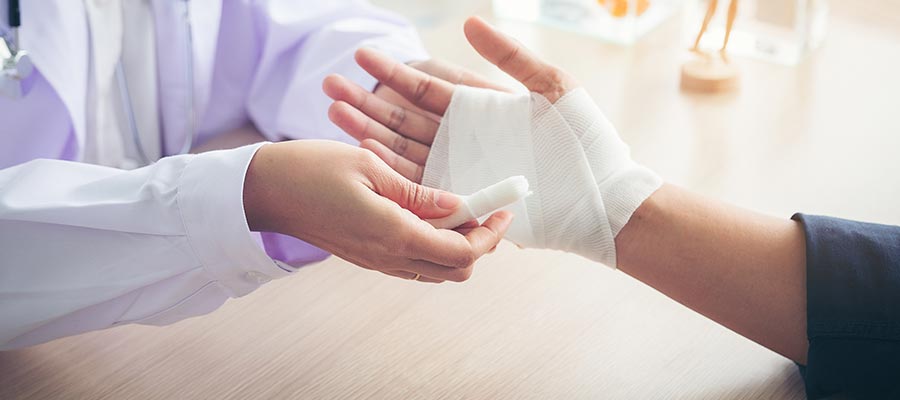Minor Injury Guideline: What to Do After a Small Accident in the USA

Even minor injuries can have a major impact on your life. Whether it’s a fender-bender, a slip and fall, or a small workplace accident, what you do immediately after the injury matters. Most people ignore minor pain or discomfort thinking it will go away—but that can be a costly mistake.
This complete guide walks you through the minor injury guideline in the U.S., explains your legal rights, outlines step-by-step actions to take, and answers common questions. This blog is designed to be clear, friendly, and packed with practical advice. Let’s get started.
What Exactly Is a Minor Injury?
A minor injury refers to physical harm that does not cause long-term damage or require extensive treatment. These injuries might not seem serious at first but can still interfere with daily life, work, and finances.
Common Minor Injuries:
- Bruises (contusions)
- Minor cuts and lacerations
- Muscle sprains and strains
- Whiplash
- Mild concussions
- Surface burns
- Light back or neck pain
Many minor injuries don’t look serious but may have underlying effects. For example, whiplash can appear mild at first but cause headaches and neck stiffness for weeks.

Immediate Steps to Follow After a Minor Injury
1. Seek Medical Attention
Do not underestimate your injury. Visit a doctor or urgent care center. Besides ensuring your safety, this visit will provide crucial medical documentation that may support future insurance or legal claims.
2. Document the Injury
Take clear photos of the injury, the scene (if applicable), and keep all medical receipts and bills. Write down the time, place, and exact details of what happened. If there were witnesses, get their contact information.
3. Report the Incident
Depending on where it happened:
- At work: Notify your supervisor and fill out an injury report.
- In public: Inform the property owner or manager.
- In a car accident: File a police report, even if damage is minor.
4. Avoid Admitting Fault
Say only what is necessary when speaking with others or filling out reports. Avoid statements like “I’m okay” or “It was my fault.” These can be used against you.
5. Keep All Records
Organize medical records, receipts, reports, and emails related to the injury. Create a folder (digital or physical) to keep everything in one place.
Understanding the Legal Side of Minor Injuries in the USA
In the U.S., even a small injury can entitle you to compensation if it resulted from someone else’s negligence. This includes injuries from car accidents, workplace incidents, defective products, or unsafe premises.
Key Legal Points:
- Negligence: You must prove that another party was careless or failed to act responsibly.
- Causation: You must show that their negligence caused your injury.
- Damages: You can claim compensation for medical expenses, lost wages, pain, and emotional distress.

Examples of Legal Claims for Minor Injuries:
- A dog bite at a neighbor’s house
- A slip and fall in a grocery store
- A minor car accident caused by another driver
- A box falling on you in a retail store
Can You File a Lawsuit for a Minor Injury?
Yes. Minor injuries can still justify a personal injury claim. Many cases are settled out of court with the responsible party’s insurance company. A lawyer can help determine if your situation qualifies and what compensation you may be entitled to.
Some people are hesitant to file claims for small injuries, thinking it’s not worth the effort. But here’s why you should reconsider:
- Medical bills can pile up quickly.
- You may lose income if you miss work.
- Minor injuries can lead to long-term discomfort or complications.
Minor Injury Claims and Insurance: What You Need to Know
Dealing With Insurance Companies
Insurance companies are trained to minimize payouts. They may:
- Offer a quick, low settlement
- Downplay your injuries
- Request unnecessary documentation
- Try to shift blame to you
Tip: Don’t accept a settlement without knowing your full medical diagnosis or speaking to a lawyer.
Tips for Speaking With Insurance Adjusters:
- Be honest but cautious
- Avoid giving recorded statements
- Stick to the facts
- Don’t downplay your injury
How to Calculate Compensation for Minor Injuries
While every case is different, compensation may include:
Economic Damages:
- Medical bills (past and future)
- Physical therapy
- Lost income
- Prescription costs
Non-Economic Damages:
- Pain and suffering
- Emotional distress
- Inconvenience
- Loss of enjoyment of life
You can estimate your case value by adding your economic costs and then multiplying by 1.5 to 3 times for pain and suffering. However, only a lawyer or claims expert can provide an accurate estimate.

Do I Need a Lawyer for a Minor Injury?
Not always—but legal help can make a big difference, especially if:
- The injury affects your ability to work
- The insurance company denies your claim
- You’re being blamed for the incident
Most personal injury attorneys offer free consultations and only get paid if you win.
Minor Workplace Injuries: Your Rights as an Employee
Under workers’ compensation laws, employees injured on the job—even slightly—are usually entitled to:
- Medical treatment
- Temporary disability benefits
- Permanent disability benefits if applicable
Report the injury to your employer immediately. You typically have a limited window (sometimes just a few days) to report a workplace injury and qualify for compensation.
Minor Injuries and Car Accidents
Car accidents are one of the most common sources of minor injuries. Even low-speed impacts can cause whiplash, back pain, or minor head trauma.
Steps to Take After a Minor Car Accident:
- Get medical attention
- Exchange information with the other driver
- Take photos of both vehicles and surroundings
- File a police report
- Contact your insurance company
In some states, you’ll deal with your own insurer (no-fault states). In others, the at-fault driver’s insurer is responsible.
Frequently Asked Questions (FAQs)
What is considered a minor injury in a car accident?
A minor injury may include soft tissue injuries, small cuts, or temporary pain. Always get checked by a doctor. CDC on car crash injuries
Can I file a claim for a small injury at work?
Yes. Workers’ comp covers injuries regardless of severity. Report the injury promptly and seek medical care. Learn more at the U.S. Department of Labor
Should I accept the insurance settlement?
Don’t rush. Insurers often offer low settlements. Consult a personal injury lawyer before accepting. Nolo explains settlement tips
How long do I have to file a personal injury claim?
The statute of limitations varies by state—usually 1 to 3 years. Check local laws. State-by-state guide on FindLaw
How do I prove a minor injury caused long-term problems?
Detailed medical records and consistent treatment are key. Keep documentation and attend all follow-up visits.
Final Advice: Don’t Ignore Minor Injuries
Many people delay care or legal action because they think their injury is too small to matter. But minor injuries can have lasting effects—and you have the right to protect yourself.
Key Takeaways:
- Always get medical care after an injury
- Document everything and report the incident
- Know your legal rights
- Don’t let insurance companies pressure you
- Talk to a lawyer if unsure
You deserve to feel safe, respected, and compensated—no matter how small the injury might seem.
Need help figuring out your next step? Consult with a local personal injury attorney. Most offer free consultations and can explain your rights clearly.
